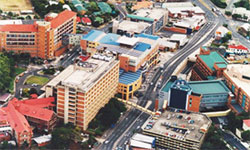September 24, 2018
Mercy Day
Mater Health Services is now a network of seven hospitals and has approximately 7500 staff and volunteers providing care to some 500 000 people each year. In October 2011, MHS was the winner of the Business South Bank Sustainability Award for its activities to date. www.businesssouthbank.com.au/sustainability
Christopher Hill, Sustainability Manager - Facilities Division, Mater Health Services explains the hard work involved in winning this award.
 |
| Mater Hospital Brisbane, Australia |
In 2008, Mater Health Services (MHS) demonstrated its commitment to sustainability by adding the objective “Be environmentally responsible” to its corporate strategy map, and by forming a Sustainability Committee (Hill, 2011). The Sustainability Committee presently has two sub-committees, (Procurement and IT, and Waste), and a third sub-committee (Energy) is anticipated (Hill, 2011).
In October 2008, the Board endorsed a set of Environmental Sustainability Principles which were developed by the Sustainability Committee. The Environmental Sustainability Principles document included the following corporate objective (MHS, 2008):
“Mater will seek to minimise our impact on the environment in the delivery of our services”
(MHS, 2008; p. 1).
The document also outlined a set of “Key Actions” to progress environmental sustainability at MHS, including (but not limited to) the following:
These Key Actions were later incorporated into a policy document entitled “Environmental Policy Statement”, which has been endorsed by the CEO.
Additionally, the Board incorporated environmental issues into its 2009-2013 Strategic Plan (Hill, 2011):
“Mater will increase its activities to ensure we optimise our position as responsible corporate citizens. Initially we will work to reduce our water usage before increasing the scope of our activities to other areas such as energy, recycling and the effective use of products” (MHS, 2009; p. 9).
Legislation also played a role in the move towards sustainability, specifically, the Clean Energy Act (2008), the Smart Energy Savings Program (2009), the State Sustainable Planning Act (2009), and the National Greenhouse and Energy Reporting Act (2010). Notably, the National Greenhouse and Energy Reporting Act (2010) requires the measurement and reporting of carbon emissions. MHS engaged the services of an external company to assist with meeting this requirement (Hill, 2011).
In March 2010, a full-time Sustainability Manager was appointed, another key milestone for MHS with regard to sustainability. Priorities for the Sustainability Manager have been measurement (e.g., carbon footprint) and staff engagement, in addition to organising various initiatives to promote and encourage sustainability.
To date, there are a total of 80 initiatives to promote and encourage sustainability. Of these, 25 have been commenced, 40 have been completed, 7 are not viable, and 8 are on hold. These initiatives fall under four categories: waste, water, energy, and procurement and IT. Examples of these initiatives include:
 |
| Mary McAleese, former President of Ireland visiting MHS, Brisbane |
As mentioned earlier, staff engagement has been a priority for the Sustainability Manager. To date, approximately 51 presentations have been made by the Sustainability Manager to more than 1,500 staff members of MHS. The presentations provide information about sustainability and carbon emissions, and how it impacts MHS (e.g. What is the Mater doing?). The presentations also contain educational material about carbon (e.g. How “big” is a tonne of carbon?). The presentations aim to encourage thinking and discussion about sustainability at all levels within the organisation, and the Sustainability Manager presents as part of formal corporate orientation for all new staff. Since the announcement of the proposed “Carbon Tax” information to Senior Management has occurred to inform them of future cost impacts for MHS.
The Sustainability Intranet page can be accessed by all MHS staff members, and contains the following pages:
In August 2011, Environmental Sustainability was included on the Mater internet webpage www.mater.org.au and outlines some of the activities to date as well as a tab linking to requirements of the Clean Energy Act (2008) and the associated “Smart Energy Savings Plan”
The Sustainability Manager has forged strong linkages with Griffith University and the University of Queensland and has conducted joint research projects around the staff engagement campaigns of “Pro Environmental behaviours in the workplace” and the “Turn it off” campaign. A new project to begin in February 2012 will be measuring the effectiveness of a voluntary pledge of sustainable behaviours. In late November 2011, a whole of staff (7000 staff) survey will include 5 specific questions relating to environmental sustainability.
Hill, C. (2009). Sustainability – 1 Year Review.
Mater Health Services (MHS). (2008). Environmental Sustainability Principles.
Mater Health Services (MHS). (2009). 2009-2013 Strategic Plan.
Case Study Prepared by Alice Miller (Griffith University), Christopher Hill (Mater Health Services) and Sally Russell (Griffith University)
Messages to Chris Hill - Chris.Hill@mater.org.au